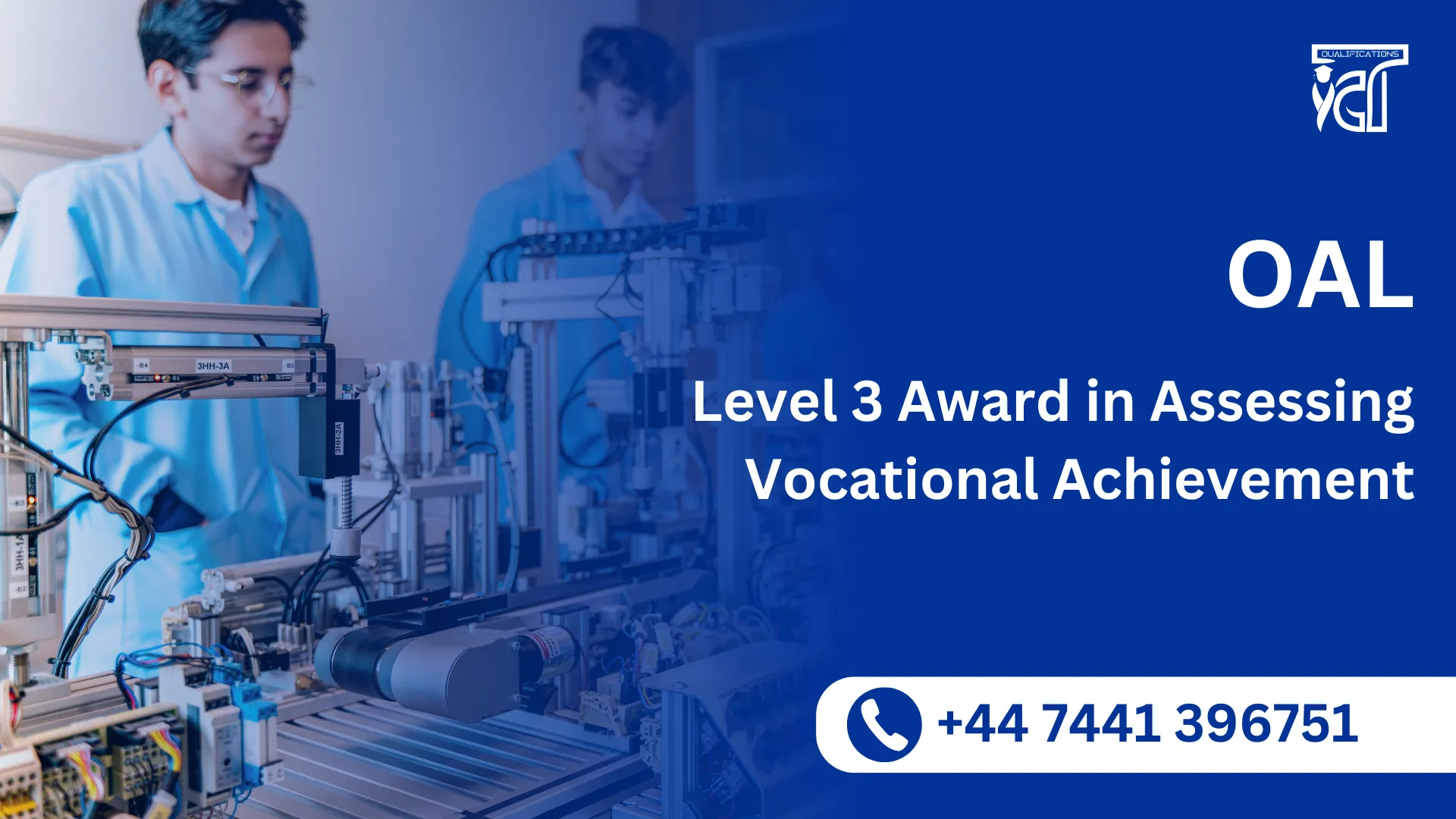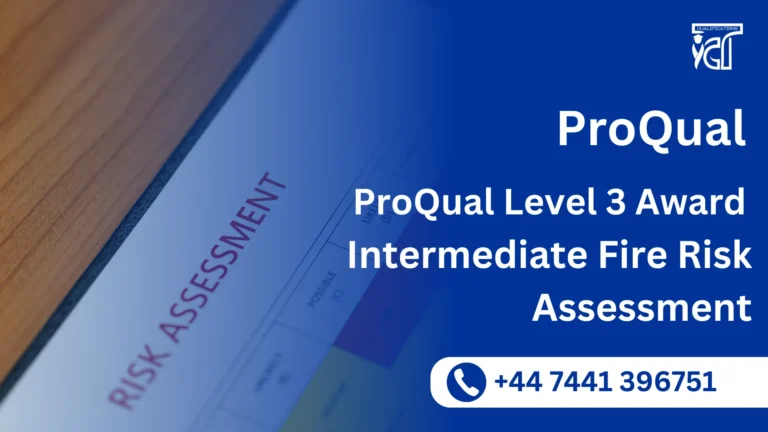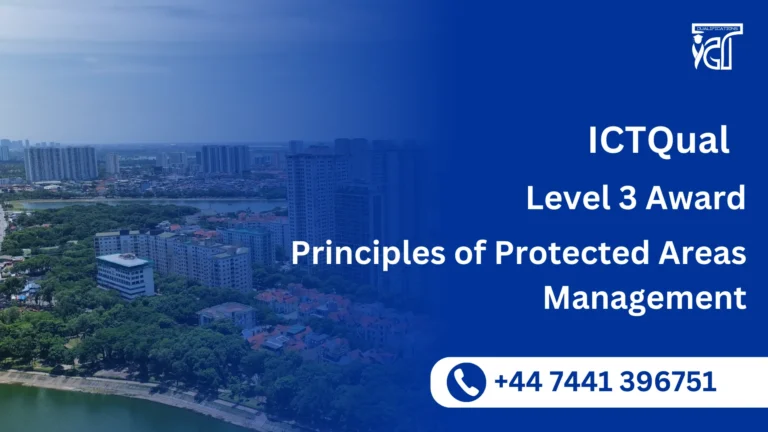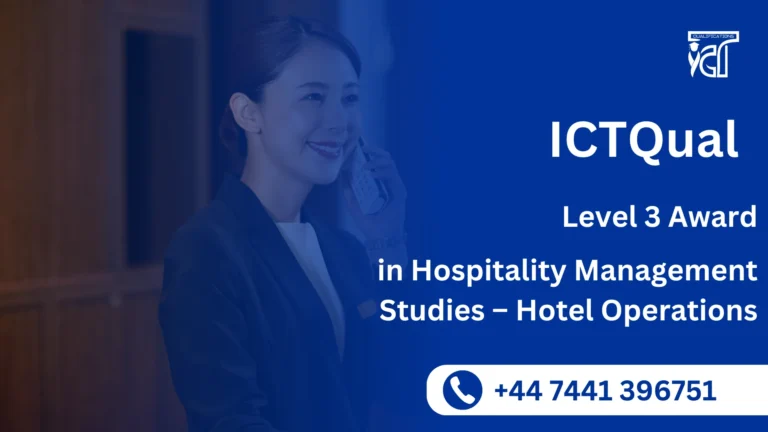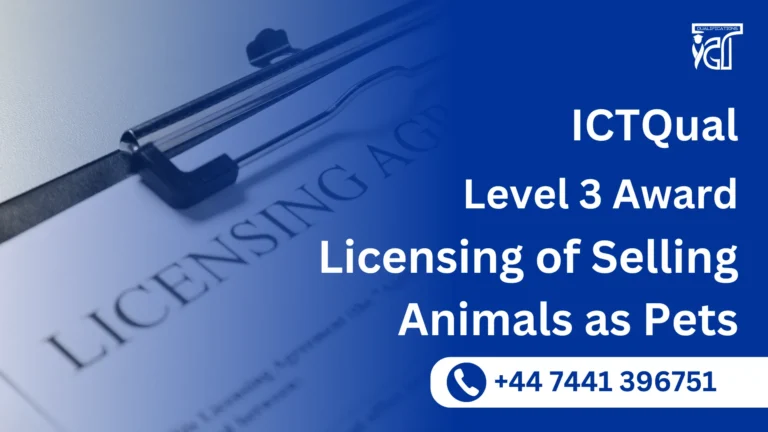The OAL Level 3 Award in Assessing Vocational Achievement is a nationally recognised qualification designed to equip individuals with the skills and knowledge required to assess vocational skills, knowledge, and understanding across a range of qualifications and sectors. Whether you’re working in education, training, apprenticeships, or workforce development, this award is your pathway to becoming a qualified assessor in the UK.
With the growing demand for skilled professionals in technical and vocational sectors, qualified assessors play a key role in maintaining high standards and supporting learner achievement. This course is ideal for those who assess in the workplace or in a learning environment such as a college, training centre, or apprenticeship programme.
This qualification meets the current standards for assessors in the UK and is often required by employers, awarding bodies, and training providers. It is suitable for assessing a wide range of qualifications including NVQs, diplomas, and apprenticeships. Whether you are looking to assess practical competence in the workplace or deliver knowledge-based assessments in a classroom setting, this qualification provides the tools to do so effectively and professionally.
By completing this qualification, learners will become recognised assessors capable of delivering quality, fair, and consistent assessments across various vocational disciplines.
The OAL Level 3 Award in Assessing Vocational Achievement is an essential qualification for those who want to assess vocational competence in a structured, legally compliant, and professional manner. Whether you’re entering the education and training sector or looking to expand your existing role in vocational assessment, this award gives you the confidence, credibility, and capability to support learner achievement at all levels.
It is your gateway to becoming a qualified assessor—trusted, respected, and in demand across multiple industries.
OAL Level 3 Award in Assessing Vocational Achievement
To achieve OAL Level 3 Award in Assessing Vocational Achievement qualification, learners are required to complete the mandatory unit and one optional unit from the available group. The qualification comprises a total of 9 credits, with 90 Total Qualification Time (TQT) and 54 Guided Learning Hours (GLH).
Mandatory Units
- Understanding the principles and practices of assessment
Optional Units
- Assess occupational competence in the work environment
- Assess vocational skills, knowledge and understanding
GLH (Guided Learning Hours) and TQT (Total Qualification Time) are terms commonly used in vocational qualifications to help define the amount of time a learner is expected to spend on their studies.
1. GLH (Guided Learning Hours)
GLH refers to the number of hours a learner spends being directly taught, supervised, or supported during their course. This includes the time spent in activities such as:
- Classroom instruction
- Practical workshops
- One-on-one tutoring or mentoring sessions
- Online learning sessions with tutor support
In other words, GLH represents the time that learners are actively engaged with their instructors or learning activities.
2. TQT (Total Qualification Time)
TQT represents the total amount of time a learner is expected to invest in completing a qualification, including:
- GLH (Guided Learning Hours): Time spent on direct learning, as explained above.
- Self-Directed Learning: This includes time spent on independent study, research, assignment completion, preparation for exams, and any other work the learner does outside of direct teaching hours.
TQT is a broader measure that includes all the time required to achieve the qualification. It helps learners and employers understand the overall commitment required for the qualification.
Key Differences Between GLH and TQT:
- GLH focuses on direct learning with guidance or supervision.
- TQT includes GLH as well as independent study time and other learning-related activities.
Example:
If a qualification has a TQT of 600 hours and a GLH of 250 hours, it means the learner should spend 250 hours in direct learning (classroom, online, or tutor-led sessions) and 350 hours on independent study or research.
Upon completing this Course students will be able to:
1. Understanding the Principles and Practices of Assessment
Learning Outcomes:
- Understand the function and purpose of assessment in learning and development.
- Identify different types and methods of assessment and when to apply them.
- Understand the principles of validity, reliability, authenticity, and sufficiency in assessment.
- Recognise legal and good practice requirements in relation to assessment.
- Explain how to involve learners and others in the assessment process.
- Understand how to provide constructive feedback and support learner development.
- Understand quality assurance and standardisation in the context of assessment.
2. Assess Occupational Competence in the Work Environment
Learning Outcomes:
- Prepare for the assessment of occupational competence in real work environments.
- Carry out assessments using appropriate methods such as observation, questioning, and review of work products.
- Make valid and reliable assessment decisions based on evidence of performance.
- Record assessment decisions accurately and in line with organisational requirements.
- Provide clear and constructive feedback to learners.
- Follow relevant legal, ethical, and health and safety practices throughout the assessment process.
3. Assess Vocational Skills, Knowledge, and Understanding
Learning Outcomes:
- Plan assessments for vocational skills, knowledge, and understanding using suitable methods.
- Use a range of assessment techniques such as tests, assignments, oral questioning, and discussions.
- Ensure the assessment environment supports fair and inclusive assessment practices.
- Make sound and consistent assessment decisions based on set criteria.
- Provide feedback that promotes learner progress.
- Maintain accurate assessment records in accordance with regulatory and organisational requirements
Benefits of the OAL Level 3 Award in Assessing Vocational Achievement
The OAL Level 3 Award in Assessing Vocational Achievement offers a wide range of professional and practical benefits for individuals who want to become qualified assessors in the vocational education and training sector. Whether you’re working in the workplace, a college, or a training centre, this nationally recognised qualification equips you with the tools to assess competence accurately, fairly, and confidently.
Here are the key benefits of completing this course:
1. Nationally Recognised Qualification
- Awarded by Occupational Awards Limited (OAL), this Level 3 Award meets current assessment standards across the UK and is widely accepted by employers, awarding bodies, and training providers.
2. Qualifies You as a Professional Assessor
- Enables you to assess learners in both workplace and classroom environments, covering practical performance as well as theoretical knowledge.
3. Enhances Career Opportunities
- Opens doors to roles such as vocational assessor, apprenticeship coach, training officer, and more. It’s a must-have qualification for anyone delivering work-based qualifications like NVQs or diplomas.
4. Increases Employability Across Sectors
- Suitable for assessing across a wide range of industries including construction, engineering, healthcare, business, hair and beauty, hospitality, and logistics.
5. Flexible Delivery and Assessment
- Many providers offer this course through blended or online learning, making it easier to complete while working full-time or managing other commitments.
6. Improves Assessment Quality and Consistency
- Teaches best practices in assessment planning, evidence collection, feedback, and record-keeping in line with UK regulatory standards.
7. Builds Confidence and Professional Credibility
- Equips you with the skills to deliver high-quality, fair, and supportive assessments—boosting your confidence and reputation as a training professional.
8. Supports Learner Success
- Gives you the ability to guide and assess learners effectively, helping them achieve their qualifications and progress in their careers.
9. Pathway to Further Qualifications
- Serves as a foundation for progressing to higher qualifications such as:
- Level 4 Award in the Internal Quality Assurance of Assessment Processes and Practice (IQA)
- Level 3 Award in Education and Training (AET)
- Certificate in Learning and Development
10. In-Demand Skillset
- As vocational education and apprenticeships continue to grow, qualified assessors are in high demand across the UK and beyond.
By completing the OAL Level 3 Award in Assessing Vocational Achievement, learners position themselves as skilled professionals with the authority and expertise to deliver quality assessments that meet national standards and employer expectations.
The OAL Level 3 Award in Assessing Vocational Achievement is designed for individuals who wish to become qualified assessors in the vocational education and training sector. This qualification is suitable for a broad range of professionals who are responsible for, or aspire to be involved in, assessing learners in both practical work environments and structured learning settings.
- Trainers and Tutors
Those currently delivering vocational qualifications who want to formally assess learners’ skills, knowledge, and performance as part of their teaching responsibilities. - Workplace Supervisors and Managers
Individuals responsible for evaluating employee competence and performance in the workplace, especially in apprenticeships or structured training programmes. - HR and Learning & Development Professionals
Staff involved in internal training, employee development, and performance assessment who need to understand the principles and practices of vocational assessment. - Aspiring Assessors
Professionals who have occupational competence in a specific trade, skill, or sector and want to gain the required qualification to assess others within their field. - Freelance Assessors and Coaches
Individuals looking to offer assessment services independently, particularly in industries such as construction, health and social care, logistics, business administration, or hospitality. - Experienced Industry Professionals Transitioning into Education
Those with substantial experience in their sector who are moving into a teaching, coaching, or assessing role and need a recognised qualification to support that transition.
Whether you’re new to assessing or want to formalise your current role, the OAL Level 3 Award in Assessing Vocational Achievement provides the essential skills and certification to work confidently and professionally as a qualified assessor across a wide range of vocational settings.
Entry Requirements
The OAL Level 3 Award in Assessing Vocational Achievement is a nationally recognised qualification designed for individuals aiming to become competent and confident assessors in vocational and workplace-based settings. To ensure that learners can fully engage with the course content and meet the practical requirements of assessment, the following entry criteria apply:
- Minimum Age
Learners must be at least 18 years old at the time of enrolment. This reflects the level of responsibility required when carrying out formal assessments in professional environments. - Occupational Competence
Learners must demonstrate occupational competence in the subject area they wish to assess. This means having a suitable level of experience, knowledge, and understanding of the vocational skill or trade they will be assessing. - Access to Learners for Assessment Practice
To meet the practical requirements of the qualification, learners must have access to at least two learners in a real or realistic assessment environment. This is essential for completing the observation and evidence-gathering elements of the course. - Literacy and Communication Skills
As the course involves written assignments, report writing, and verbal feedback, learners must have a good standard of English literacy and communication skills. This ensures they can engage with course materials, complete documentation, and communicate clearly and professionally. - Workplace or Learning Environment Access
Learners should either be working in, or have access to, a relevant training or workplace setting where they can carry out assessments and gather evidence for their portfolio.
These entry requirements ensure that learners are well-positioned to succeed on the course, apply their learning effectively, and qualify as competent vocational assessors.
Register Now
Qualification Process
Qualification Process for the OAL Level 3 Award in Assessing Vocational Achievement
- Self-Assessment:
Begin by evaluating your eligibility to ensure you meet the qualification requirements, including work experience, knowledge, and language proficiency. - Registration:
Complete your registration by submitting the required documents, including a scanned copy of a valid ID, and paying the registration fee. - Induction:
An assessor will conduct an induction to confirm your eligibility for the course and explain the evidence requirements. If you do not meet the criteria, your registration will be canceled, and the fee will be refunded. - Assignments & Evidence Submission:
Provide all assignments and the necessary evidence based on the assessment criteria outlined in the course. If you are unsure of the required evidence, consult with the assessor for guidance on the type and nature of evidence needed. - Feedback and Revision:
The assessor will review your submitted evidence and provide feedback. Evidence that meets the criteria will be marked as “Criteria Met,” while any gaps will be identified. You will be asked to revise and resubmit if needed. - Competence Evidence:
Submit final evidence demonstrating that all learning outcomes have been met. This evidence will be marked as “Criteria Met” by the assessor once it is satisfactory. - Internal Quality Assurance (IQA):
The Internal Quality Assurance Verifier (IQA) will review your evidence to ensure consistency, quality, and compliance with standards. - External Verification:
The IQA will submit your portfolio to OAL External Quality Assurance Verifiers (EQA) for final confirmation. The EQA may contact you directly to verify the authenticity of your evidence. - Certification:
Upon successful completion of all checks, OAL will issue your official certificate, confirming that you have attained the OAL Level 3 Award in Assessing Vocational Achievement.

